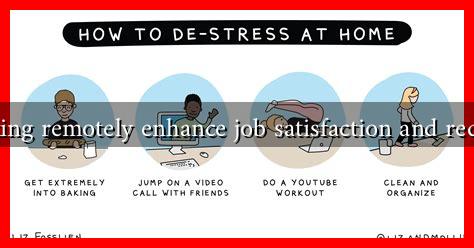-
Table of Contents
Does Working Remotely Enhance Job Satisfaction and Reduce Stress?
In recent years, the concept of remote work has gained significant traction, especially following the global pandemic that forced many organizations to adapt to a new way of operating. As companies and employees alike have navigated this shift, a critical question has emerged: does working remotely enhance job satisfaction and reduce stress? This article delves into the various dimensions of remote work, exploring its impact on employee well-being, productivity, and overall job satisfaction.
The Rise of Remote Work
Remote work is not a new phenomenon, but its adoption has accelerated dramatically. According to a report by Stanford University, remote work has increased by 42% since the pandemic began, with many companies opting for hybrid models that blend in-office and remote work. This shift has prompted researchers and organizations to examine the implications of remote work on employee satisfaction and stress levels.
Benefits of Remote Work on Job Satisfaction
One of the most significant advantages of remote work is its potential to enhance job satisfaction. Here are some key factors contributing to this phenomenon:
- Flexibility: Remote work allows employees to create their own schedules, accommodating personal commitments and preferences. This flexibility can lead to a better work-life balance, which is crucial for job satisfaction.
- Reduced Commute: Eliminating the daily commute saves time and reduces stress. A study by the U.S. Census Bureau found that the average American spends about 26 minutes commuting each way. Remote work eliminates this burden, allowing employees to invest that time in personal or professional development.
- Personalized Work Environment: Working from home enables employees to customize their workspace to suit their preferences, which can enhance comfort and productivity.
Impact on Stress Levels
Remote work can also play a significant role in reducing stress. Here are some ways it achieves this:
- Control Over Work Environment: Employees can create a workspace that minimizes distractions and promotes focus, leading to lower stress levels.
- Increased Autonomy: Remote work often comes with greater autonomy, allowing employees to manage their tasks and time more effectively, which can reduce feelings of overwhelm.
- Health Benefits: Remote work can lead to healthier lifestyle choices, such as cooking at home and exercising more, which can contribute to lower stress levels.
Case Studies and Statistics
Several studies have highlighted the positive effects of remote work on job satisfaction and stress reduction. For instance, a survey conducted by Buffer in 2021 revealed that:
- 97% of remote workers would recommend remote work to others.
- 32% of respondents cited work-life balance as the biggest benefit of remote work.
- 22% reported increased productivity as a key advantage.
Moreover, a study published in the Journal of Business and Psychology found that employees who worked remotely reported higher job satisfaction and lower stress levels compared to their in-office counterparts. This research underscores the potential of remote work to foster a more positive work experience.
Challenges of Remote Work
While remote work offers numerous benefits, it is not without its challenges. Some employees may experience feelings of isolation, difficulty in communication, and challenges in separating work from personal life. To mitigate these issues, organizations can implement strategies such as:
- Regular check-ins and virtual team-building activities to foster connection.
- Clear communication protocols to ensure everyone is on the same page.
- Encouraging employees to set boundaries between work and personal time.
Conclusion
In conclusion, working remotely has the potential to significantly enhance job satisfaction and reduce stress for many employees. The flexibility, reduced commute, and personalized work environment contribute to a more fulfilling work experience. However, organizations must also address the challenges associated with remote work to ensure that employees remain connected and engaged. As the future of work continues to evolve, understanding the dynamics of remote work will be crucial for fostering a healthy and productive workforce.
For more insights on remote work and its implications, you can visit Forbes.

